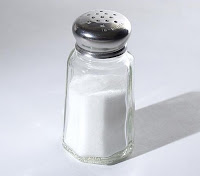The so called "fight or flight" response is mediated by something called your sympathetic nervous system. It is considered your short-term stress response (your long-term stress responses is mediated by a different but very closely related system). Many individuals experience chronic activation of this "fight or flight" system. In reality, this physiological response is supposed to engage when needed and then turn off when there is no immediate need for it. Unfortunately, our crazy world and busy lives often induce chronic activation of your sympathetic system.
For example, it is well known that obesity promotes excessive sympathetic activation. We are still learning why this happens, but several ideas have been proposed.
"Several mechanisms have been proposed to explain the SNS activation in obese subjects; increased leptin concentration, hyperinsulinemia, obstructive sleep apnea, decreased arterial baroreflex sensitivity, elevated plasma angiotensin, obesity-related kidney disease and lack of exercise." Int J Hypertens 2011; Jan 20:642416.
Even in non-obese individuals, it is not uncommon to have excess sympathetic activation. This is consistent with the dramatic rates of hypertension, fast resting heart rates, poor digestion, erectile dysfunction etc. All these problems, while multi-faceted, have a layer of excess sympathetics. Now let's consider bone health.
Does the sympathetic dominance commonly seen influence bone metabolism? The answer is, yes.
"...increasing clinical and experimental evidence has driven attention towards the pivotal role of the sympathetic nervous system (SNS) in bone remodeling" Ageing Res Rev 2011 Jan 22.
What does this mean for the average person concerned with their bone health? It means calm down your sympathetic nervous system. I realize this presents a big bag of worms that poses the question, "how do you calm down sympathetics?" We'll address some of the science at a later point, but for now...a healthy lifestyle; eating lots of plants, regular exercise, stress management, lots of water and general avoidance of the "bad stuff." I realize this isn't exactly a thrilling game plan. But when you understand that a poor lifestyle influences bone health in a myriad of ways, it is my hope that that will be greater motivation for you to stick to it.
If we were to stop this series right now, a healthy diet would help bones because:
1. Decreasing sodium would decrease calcium excretion.
2. You would calm down sympathetic dominance which would in turn, stop irritating the bones.
We'll continue on and expand our understanding of the many variables that influence bones.
 I wanted to another thought on cortisol and the influence on bone. Many people have heard of cortisone. You may have received a cortisone injection for a nagging tendinitis or recurrent musculoskeletal complaint. Many physicians will limit the number of cortisone injections a person can receive at the same site per year. In other words, if you have an injection in the elbow, most physicians will not allow more than 3 per year. The primary concern is the potential side effects including bone loss and joint damage to the area it is administered.
I wanted to another thought on cortisol and the influence on bone. Many people have heard of cortisone. You may have received a cortisone injection for a nagging tendinitis or recurrent musculoskeletal complaint. Many physicians will limit the number of cortisone injections a person can receive at the same site per year. In other words, if you have an injection in the elbow, most physicians will not allow more than 3 per year. The primary concern is the potential side effects including bone loss and joint damage to the area it is administered.


